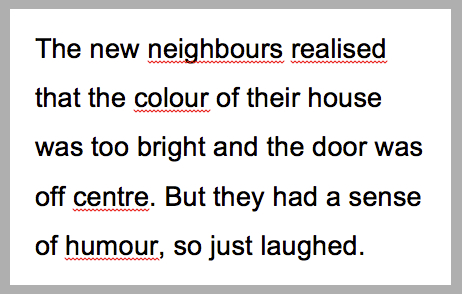Ever noticed that your computer and phone speak a different dialect of English from yours? How they think 'colour', 'analyse' and 'centre' are spelling mistakes when you know for a fact that they are spelled correctly? For the most part, those of us who write the Queen's English have become so used to being erroneously corrected by our computers that we don't even notice it any more.
It's time to do something about it.
Very broadly, there are two main English 'dialects' when it comes to spelling. The main differences are in word endings:
'British English' uses -ise (analyse, organise), -our (colour, honour) and -re (centre) endings.
'American English' uses -ize, -or and -er endings (organize, color and center).
In Australia, we generally use and recognise the British forms, probably because of our cultural heritage. However, particularly because of the predominance of American forms on the internet, Australians (along with those from many other Commonwealth nations) are comfortable reading either variety. Increasingly, the -ise and -ize words are used interchangeably: Australia's Macquarie Dictionary recognises both forms.
How to choose spelling for your own writing
This begs the question: from an Australian perspective, which form of spelling should we use, particularly if writing for the web when our words will be read by Americans and the British?
There is no hard and fast answer, but here are three guidelines:
On the web, stick to British English if your site will predominantly be read by Australians and/or those from England and other nations of the old British empire. Use American English only if your site is specifically targeting a US or broadly international audience.
For books and ebooks, the same guidelines apply though there is probably a stronger slant towards the use of British English for books published in Australia. Still, use of American English is a perfectly valid choice if you feel more comfortable with it (or want your American readers to feel more comfortable with it).
Above all, be consistent. The worst thing you can do is mix and match both forms in one document. Choose one 'dialect' and stick with it. This applies to -ise/-ize words too – if you decide to use -ize spellings alongside colour and centre, make sure you use -ize spellings throughout.
Changing your computer's language
You can get your computer and phone speaking the same language as you. I won't go into the details for all operating systems and software here or this will become a very lengthy post – Google is your friend. Here are two common scenarios:
In Microsoft Word, go to Tools > Languages. Choose your preferred language from the list. (I prefer to use UK English rather than Australian English as Word seems to think Australians spell like Americans.) Click on the Default button and confirm your changes. In future, new documents will adopt your chosen language.
On an iPhone, go to Settings > General > Language. Here, 'English' equals 'US English'. Choose 'British English' and click Done. Android and other phones have similar menu settings.
This post was inspired by an excellent recent article and analysis of the British vs American English debate. It is well worth a read if you are interested in this topic.
This article was update in June 2022


